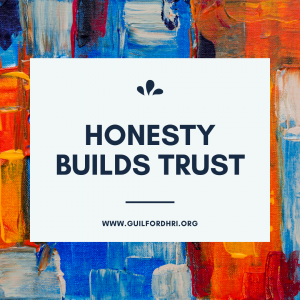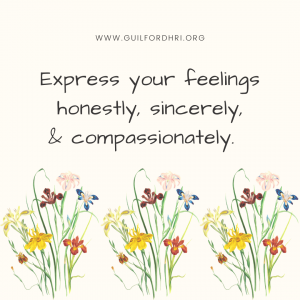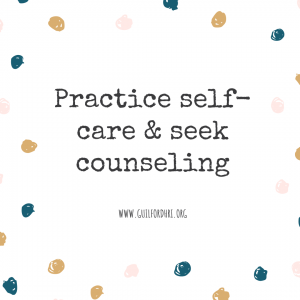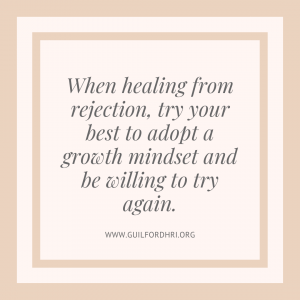
Honesty is key to a healthy relationship! By being honest with one another, you and your loved one can build trust and deepen connection in your relationship.

Honesty is key to a healthy relationship! By being honest with one another, you and your loved one can build trust and deepen connection in your relationship.

Healthy communication is an important part of relationships! When expressing your feelings with your partner, be honest, sincere, and compassionate. The way we speak to one another matters, and when we choose to use kind words and speak from a place of sincerity and compassion, we can promote understanding and connection in our relationships!

An important part of healing after experiencing rejection is practicing self-care. Be intentional about making time to take care of yourself mentally, physically, emotionally, and/or spiritually. Listen to your body and reflect on what you need to recharge and build yourself back up. Be gentle and kind to yourself. You deserve to take care of your needs and focus on yourself. We encourage you to identify things that you can do to promote relaxation, wellness, and joy in your life. Make time for yourself and practice self-care often!
Another key component in taking care of your mental, emotional, and spiritual needs is to seek professional counseling! Counselors can help you process your emotions and cultivate a path of healing and growth after experiencing rejection. If you feel like you are having a hard time coping with rejection and healing on your own, we encourage you to reach out to a counselor for some extra support. Know that seeking support from a counselor is also important even if you don’t feel like you’re struggling and have a handle on things. For more information about finding a counselor visit our previous blog, How to Find a Counselor to Help with Relationship and Family Challenges.

After experiencing rejection, it can be challenging to maintain a positive perspective and put yourself out there again. The idea of being vulnerable and risking rejection again can be scary and daunting. However, it is important to try your best to open yourself up to connection and be willing to try again. We encourage you to adopt a growth mindset and maintain a positive attitude!
When healing from rejection, try to shift your perspective and view rejection as an opportunity to learn more about yourself and experience growth. This can help you feel more confident, build up your self-esteem, and develop connections and relationships with others. When adopting a growth mindset and opening yourself up to vulnerability, be gentle and kind with yourself. Know that it may take time to feel ready. Healing is a process and doesn’t happen overnight. Be patient with yourself.

An important part of healing from rejection involves leaning on your support system. By reaching out to people who you can depend on, you can feel connected, supported, and grounded. This is especially important, as rejection can often leave us feeling untethered and lonely.
Surrounding yourself with your support system can remind you that you are loved and cared for by others, while also providing listening ears or a shoulder to cry on. Though it can feel challenging to engage in social connection after experiencing rejection, we encourage you to reach out to your support system!

By Eleanor Beeslaar, HRI Graduate Assistant
Because experiencing rejection can often hurt our self-esteem, it’s important to be intentional about building ourselves up and increasing our sense of self-worth. We encourage you to reflect on the things that you love and value about yourself! When you make an effort to recognize aspects of yourself that you are proud of, it will improve your self-esteem and remind yourself that you are strong and worthy of connection and happiness!
To get started, try some of these tips to help you build up your self-esteem:

By Eleanor Beeslaar, HRI Graduate Assistant
When we experience rejection, it is easy to fall into a pattern of self-blame and criticism. We may question whether we did something wrong or think that it was our fault that we were rejected. This can lead to us criticising aspects of our personality, and engaging in negative self-talk that lowers our self-esteem and sense of self-efficacy.
Remember, you did not experience rejection because there is something fundamentally wrong with you. Rejection occurs due to a multitude of factors, including life events, life stages, circumstance, and both people in the relationship. Though we know it can be challenging, we encourage you to try your best to refrain from self-blame and criticism! When you notice yourself engaging in negative self-talk, self-blame, or criticism, challenge it with positive self-talk. Instead of saying “It’s my fault that they left,” or “I’m not good enough,” try “Sometimes relationships end and that’s okay. It’s not my fault. Although this is hard, I will get through it. I am worthy of happiness and love.”
We know that challenging self-blame and criticism can be difficult, so be kind to yourself if you notice yourself slipping up. This process won’t happen overnight. Give yourself time to adjust and get into the habit of using positive self-talk to overcome negative thoughts and self-talk.

By Eleanor Beeslaar, HRI Graduate Assistant
An important part of healing from rejection is allowing yourself to feel and express the emotional pain that often goes hand in hand with rejection. Acknowledging your pain instead of holding it in and letting it bottle up can help you process and move past rejection.
Give yourself space to feel. Be gentle with yourself, and remember that emotional expression is a healthy and normal part of healing. If you need to cry, cry. If you need some time to be by yourself, give yourself permission to do so. If you need to talk it out, find a trusted friend with whom you can share your experiences and your pain. If writing helps you express and process your feelings, set aside some time to journal. We encourage you to engage in whatever healthy emotional expression looks like for you!
As you give yourself space to experience your emotions, remember, the pain that you feel will not last forever. Think of your emotions as waves in the ocean. Throughout life, your emotions will ebb and flow, changing with each experience and life event. At times you will feel sadness and pain, but they too will pass, and you will find peace and joy.
We are excited to partner with the UNC Greensboro Men’s Basketball team to offer an opportunity for individuals to connect with their loved ones during the week of Valentine’s Day, while supporting the Spartans against Western Carolina. Use the discount code (HRIWeek) to receive discounted tickets and arrive early to visit the HRI table for free resources and giveaways!
Learn more by visiting our Facebook page!
Purchase tickets here!

By Eleanor Beeslaar, HRI Graduate Assistant
Rejection is a common, yet painful experience, and it can occur in many different types of relationships and settings. You may have experienced rejection in romantic relationships, friendships, family relationships, or potentially at work. Rejection can leave us feeling devastated and can lead to feelings of insecurity and uncertainty, impacting our overall sense of self-efficacy and self-esteem.
You may be wondering, “Why is rejection so painful?” According to a research study using an fMRI to examine participants’ brains while looking at pictures of their romantic partners after recently being broken up with, the same part of the brain that responds to physical pain was activated (APA, 2012). Similar studies examining participants’ brains while experiencing rejection found the same patterns linking physical and emotional pain (APA, 2012).
Why is this important? Humans have a need to belong and feel loved and accepted. When we experience rejection, this need is neglected, and in response, we experience emotional pain. Often times, when we experience rejection, we go to a place of self-criticism, blaming ourselves for whatever happened. This pattern of self-blame intensifies the emotional pain we are already experiencing, leading to lower self-esteem and negatively impacting our emotional well-being and mental health.
If you’re reading this, know that you are not alone. We all experience rejection throughout our lives and many of us have responded to rejection in similar ways, using patterns of self-criticism. However, there are healthier ways to respond to rejection. Throughout the next week HRI will be sharing a series of tips to help you identify and practice healthier ways to cope with and heal from rejection!
References
Weir, K. (2012). The Pain of Social Rejection. Retrieved from https://www.apa.org/monitor/2012/04/rejection